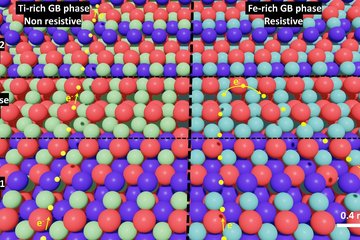All genres
1701.
Talk
Deformation induced dislocation interactions near martensite-ferrite phase boundaries. MRS Fall Meeting 2011, San Francisco, CA, USA (2011)
1702.
Talk
Advanced Tomographic Tools for Reconstruction and Analysis of 3D-EBSD Datasets. RMS Electron Back Scatter Diffraction Conference 2011, Düsseldorf, Germany (2011)
1703.
Talk
Eine modulare Kristallplastizitäts Implementierung für Anwendungen vom Einkristall bis zum Bauteil. 14. Workshop Simulation in der Umformtechnik, Dortmund, Germany (2011)
1704.
Talk
Combining characterization and simulation of grain-scale plasticity in three dimensions. EBSD Conference 2011 of the Royal Microscopical Society, Düsseldorf, Germany (2011)
1705.
Talk
Enhancing mechanical properties of calcite by Mg substitutions - An ab initio study. American Physical Society - March Meeting, Dallas, TX, USA (2011)
1706.
Talk
Mechanical Design Principles of Crustacean Cuticle evaluated experimentally and by Ab initio-based Multiscale Simulations. Institute Colloquium, Institut de Mécanique des Fluides et des Solides, CNRS, Strasbourg, France (2011)
1707.
Talk
A modular crystal plasticity framework applicable from component to single grain scale. IUTAM Symposium Linking Scales in Computations: From Microstructure to Macro-scale Properties, Pensacola, FL, USA (2011)
1708.
Talk
Deformation-induced geometrically necessary dislocation evolution in dual-phase steel. 20th EBSD Conference, Düsseldorf, Germany (2011)
1709.
Talk
How to capture mesoscale plastic strain gradient effects in a physical way -- a look at dislocation mechanics and computational aspects. MST Symposium, Los Alamos National Laboratory, Los Alamos, NM, USA (2011)
1710.
Talk
Hybrid LB-FEM modeling of dense suspensions of deformable particles under shear. SFB TR6 Seminar, Institut für Theoretische Physik II, HHU Düsseldorf, Germany (2011)
1711.
Talk
Combining ab initio calculations and high-resolution experiments to understand advanced Mg alloys. German-Korean workshop on the “Production and industrial applications of semi-finished Mg products”, Irsee, Germany (2011)
1712.
Talk
Enhancing mechanical properties of calcite by Mg substitutions: A quantum-mechanical study. DPG Frühjahrstagung, Dresden, Germany (2011)
1713.
Talk
Ab initio study of thermodynamic, structural, and elastic properties of Mg-substituted crystalline calcite. TMS 2011, San Diego, CA, USA (2011)
1714.
Talk
Arthropod cuticle: A biological multi-functional composite used as template for nano-to-macro-scale hierarchical modelling. Euro BioMat, Jena, Germany (2011)
1715.
Talk
Arthropod cuticle: A biological multi-functional composite used as template for nano-to-macro-scale hierarchical modelling. THERMEC 2011, Quebec, Canada (2011)
1716.
Talk
Mesoscopic modeling of red blood cell dynamics. Oberseminar: Theorie komplexer Systeme WS 2010, Institut für Theoretische Physik, Universität Heidelberg, Germany (2010)
1717.
Talk
Modeling the hardening behavior of TWIP steels: A statistical dislocation density-based approach. MRS 2010 Fall Meeting, Boston, MA, USA (2010)
1718.
Talk
Design Principles of Load-bearing Cuticle from different Crustacean Species evaluated experimentally and by Ab initio-based Multiscale Simulations. MRS Fall Meeting 2010, Boston, MA, USA (2010)
1719.
Talk
Mesoscopic Modeling of the dynamics of red blood cells. Seminar talk at Ruhr-Universität Bochum, Lehrstuhl für Biophysik, Bochum, Germany (2010)
1720.
Talk
Solving Elastoviscoplastic Mechanical Boundary Value Using a Spectral Method. Evaluierung des Christian-Doppler-Laboratorium für Werkstoffmechanik von Hochleistungslegierungen, Garching, Germany (2010)











